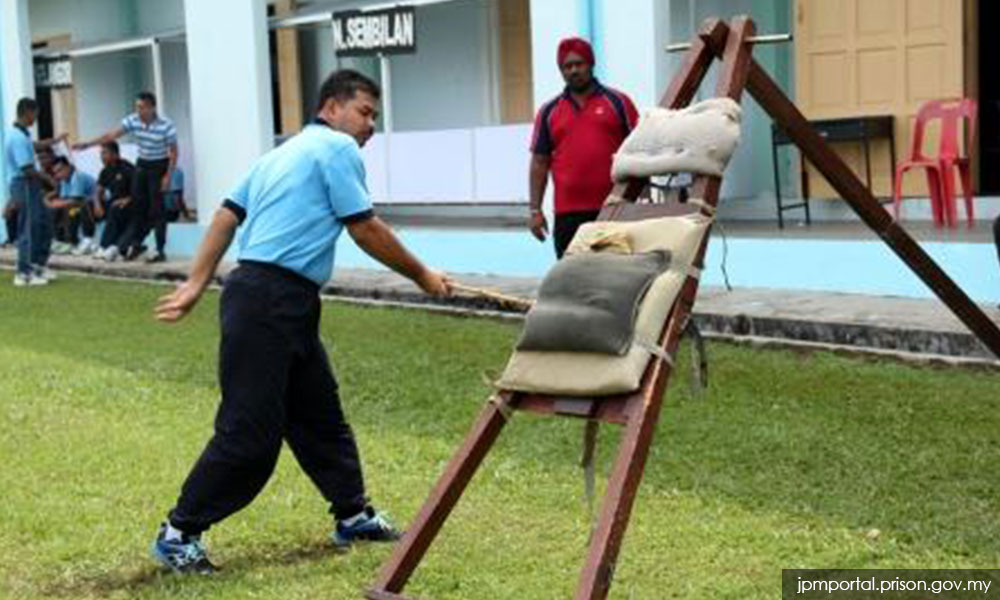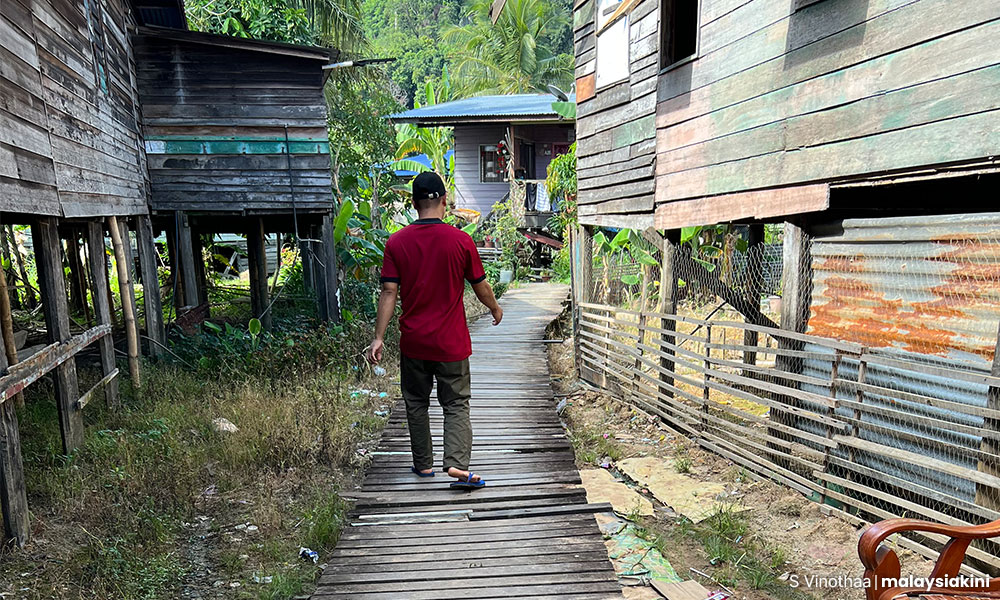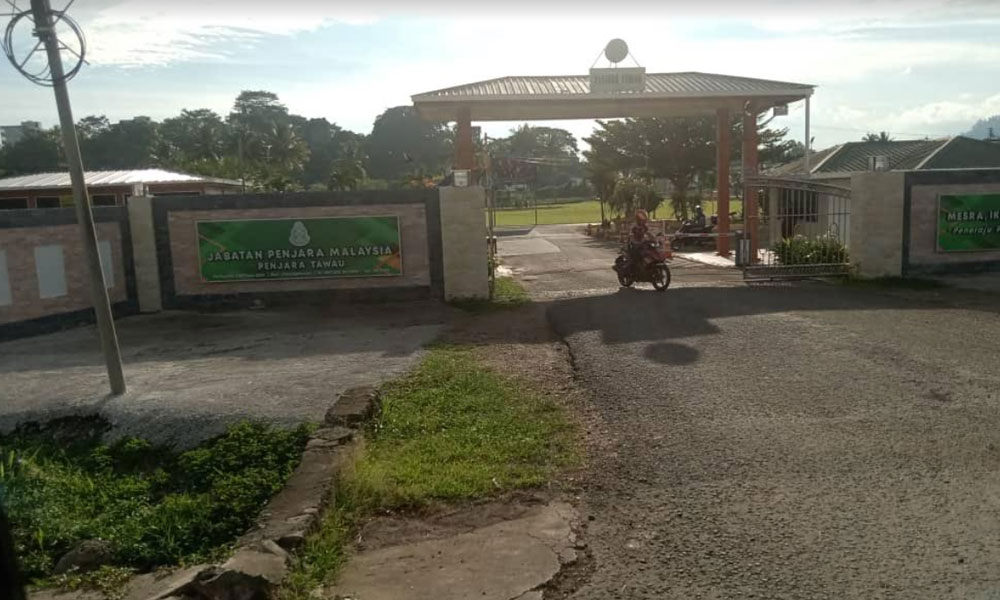The Indonesian migrant worker who was wrongfully imprisoned and whipped said he was among 35 other Tawau Prison inmates who were whipped on the same day, one after another.
Recalling his harrowing experience waiting for his turn to be whipped, Sabri Umar said all the inmates were asked to strip with only a piece of cloth to cover their private parts.
“We took turns to step onto a wooden frame and our legs were spread apart but not bound. Our hands were spread upward and tied to the frame we were standing on.
“They untied us after the caning and told us to put on our shirts back while we waited in a group and watched others being caned,” described the 31-year-old, his voice quavered as if he was reliving the horror again.
Sabri said it was a terrifying moment being gathered in the same area and witnessing others before him being caned.
“Many of them screamed and cried, but those who were stronger didn’t cry. I remember one person receiving 10 strokes that day.
“After being caned, I immediately felt drained of all my energy. The cane tore the skin on my buttocks and I started to bleed after a few minutes.
“I could not sit for the next 10 days and I slept facing down to avoid making my wounds worse,” Sabri recalled.

Sabri’s woes
Over a period of just four months since April, the former employee of a plywood factory in Kalabakan in Tawau, Sabah, was wrongfully terminated of his employment, arrested and wrongfully detained by the Tawau police.
Sabri was investigated under Section 14(a) of the Sexual Offences Against Children Act 2017 but eventually charged and sentenced under Section 6(1) (c) of the Immigration Act 1959/63.
He claimed to be innocent of both charges, but the Sessions Court sentenced him to 11 months in jail and five strokes of the cane.
Four months after his arrest, Sabri was acquitted by the High Court in Tawau, but he lived in constant fear of a re-arrest under the sexual offence and of finding himself behind bars as swiftly as he was put there the first time.
Owing to the swift manner by which he was imprisoned and sentenced, Sabri agreed that there was a high possibility that there were other wrongfully imprisoned inmates in the Tawau Prison.
Sabri, who now has the support of the Indonesian Consulate in Tawau, was administered five strokes of the cane despite a pending notice of appeal and he told Malaysiakini that he would seek justice.
For two days after the whipping, Sabri was running a fever and he only took the yellow medicine handed to each inmate after the caning.
He alleged that they received no other medications and some inmates who also had fever were asked to just take a cold shower.
After his acquittal, he went to see a doctor and get himself checked as he was experiencing pain when urinating.
The consul at the Indonesia Consulate in Tawau, Heni Hamidah, told Malaysiakini that they sent Sabri for a second medical test on Monday to find out the extent of the complications resulting from the whipping.

‘Ratify UN Convention against torture’
Criminal lawyer Michelle Rossana Usman from Kota Kinabalu, who was engaged to represent the migrant worker by the Sabah Timber Industry Employees Union of which Sabri is a member, noted Malaysia’s notoriety for its flogging practices.
Quoting a statistic by Amnesty International, Michelle said the international human rights organisation estimates that as many as 10,000 people are subjected to caning in Malaysia every year, most of whom are foreign nationals.
"Sabri was unfortunately whipped for an offence that he could not have been guilty of as he had proper documentation to enter Malaysia as a migrant worker.
"It is high time Malaysia ratifies the UN Convention against Torture and Other Cruel, Inhuman or Degrading Treatment or Punishment.
"The government also needs to ratify the International Covenant on Civil and Political Rights," she stressed.
Michelle, who is a member of the Sabah Human Rights Centre, pointed out that Sabri's case was an example of a workers' union member who was wrongfully charged with crimes he was not guilty of.
"What about the thousand others who are charged in our courts but are not represented at all?" she asked.
Michelle urged the government to amend existing legislation to treat immigration violations as administrative offences, rather than crimes punishable with imprisonment and caning.

Judicial caning in Malaysia and Saudi Arabia
Judicial caning in Malaysia is meted out for more than 60 criminal offences such as drug trafficking, rape, illegal entry into Malaysia under the Immigration Act 1959/63 and making false passports under the passport Act 1966.
According to the Amnesty International Report 2020/21, the judicial caning sentence was also meted out to Rohingya refugees during the pandemic.
Following protests from local activists, the sentence was set aside for the 27 Rohingya refugees at a hearing in the High Court in Alor Setar in 2020. However, the migrants continued to be caned, in addition to their prison sentences for illegal entry into Malaysia.
The 27 refugees, who were among 40 refugees convicted by a Magistrate’s Court in Langkawi for entering Malaysia without a valid permit, had obtained legal representation to appeal.
The 40 were also sentenced to seven months in jail.
The High Court in Alor Setar decided that caning would be inhumane as the men were refugees with no prior history of criminal activity or violence.
Meanwhile, a country that was known to carry out flogging in public squares, Saudi Arabia, abolished that corporal punishment in April 2020.
Crown Prince Mohammed Salman has spared the rod and offenders will instead be fined or receive jail sentences. - Mkini





No comments:
Post a Comment
Note: Only a member of this blog may post a comment.